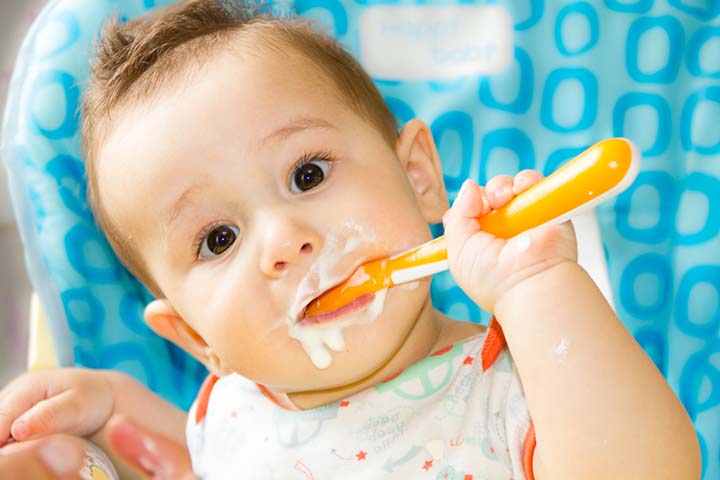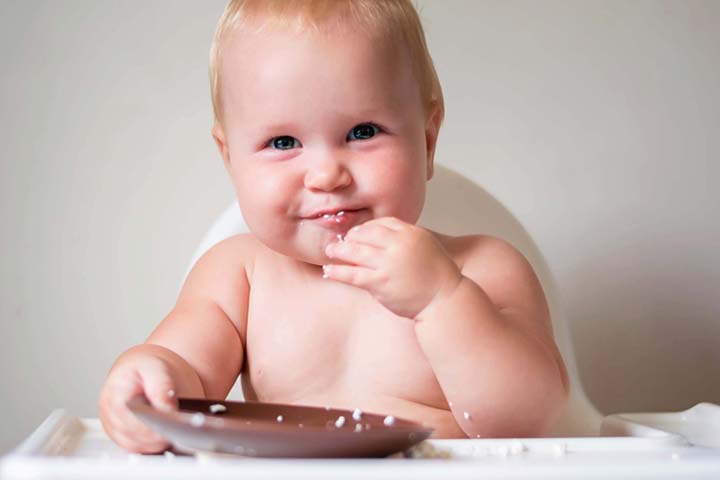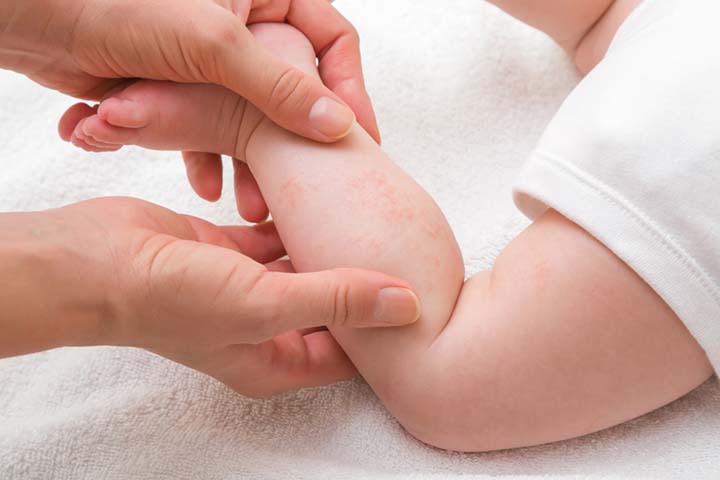Babies frequently experience a number of gastrointestinal issues, ranging from a brief stomach ache to constipation and diarrhea. Several treatments are available to help with these issues, but probiotics for babies stand out among them. Probiotics are “good” microorganisms that help repair a malfunctioning digestive tract. Adults love probiotics, but are they safe to use for babies? Read this post to get answers to this query and other details on probiotics for infants.
What Are Probiotics?
Probiotics are live bacteria similar to those naturally found in our gut, previously known as “intestinal flora” but more recently referred to as microbiota or gut microbiome (1). Unlike infectious bacteria, probiotic bacteria are the “good” or “friendly” bacteria that restore the population of existing bacteria in the gut. Two genera of bacteria are categorized as probiotics, as they come from the genus Lactobacillus and Bifidobacterium.
There are multiple species of bacteria in each genus, each with various strains. These probiotic bacteria can be found naturally in several foods and are also present in commercially sold probiotic products.
How Are Probiotics And Prebiotics Different From Each Other?
Both probiotics and prebiotics are advantageous for the gut microbiome, each playing distinct roles in supporting the same process through different mechanisms. Probiotics consist of living bacterial strains that contribute to the ‘good bacteria’ population in the gut. In contrast, prebiotics are non-digestible plant fibers that serve as a source of nourishment for the healthy bacteria residing in the gut, thereby promoting the growth and activity of probiotics (2) (3) (4).
What Are The Sources Of Probiotics For Babies?
Here are the best sources of probiotics for your baby (5):
- Yogurt
- Probiotic infant cereal
- Probiotic infant formula
- Soy milk
- Cottage cheese
- Probiotic drops and powder for babies
- Fermented soy, milk, and vegetable products
What Probiotics Are Present In Infant Formula?
The most common probiotic strains that are added to infant formulas include (6):
- Streptococcus thermophilus
- Lactobacillus reuteri (DSM 17938)
- Bifidobacterium breve (BC50)
- Bifidobacterium lactis (Bb12)
- Lactobacillus fermentum (CECT5716)
- Lactobacillus rhamnosus
The supplementation of infant formula with these beneficial probiotic strains contributes to your baby’s adequate growth and development by facilitating the effective digestion and absorption of essential nutrients and fluids.
When Can Babies Have Probiotics?
The source of the probiotic determines when your baby can have it. Here is the average age to introduce probiotics to the baby, depending on the different food sources:
- Yogurt: 12 months. You can try introducing it around the age of nine months (7) (8).
- Soy milk: 12 months
- Cottage cheese: 12 months
- Probiotic drops, infant formula, and infant cereal: Probiotic drops and infant formula may be available for babies as young as three months old. However, it is best to consult the doctor before giving probiotics to infants below the age of six months. Infants older than six months can safely have probiotic infant cereal, formula, and drops. Formulas containing probiotics are beneficial for formula-fed babies as they promote a balance of microorganisms in the intestines and reduce the growth of infection-causing organisms.
- Fermented soy, milk, and vegetable products: Several traditionally fermented products contain strains of Lactobacillus and Bifidobacterium. Examples of milk-based fermented products are kefir and some types of cheese. Miso and tempeh are fermented soy delicacies that are a dairy-free source of probiotic. Kimchi and Sauerkraut are preparations made by fermenting vegetables with bacteria.
Most cheeses and other fermented milk preparations can be safely introduced to babies at the age of 12 months.
Fermented soy and vegetable preparations can also be given at 12 months, but since they contain high quantities of sodium, consult a pediatrician before trying them.
How Do Probiotics Work?
Here is how probiotics usually work in infants (9):
- Topping up gut bacteria population: Sometimes infection or treatment with antibiotics may reduce the population of healthy intestinal bacteria. Probiotics help restore the good bacteria in the gut.
- Boosting existing gut bacteria population:Gastrointestinal infections and bacteria from food can increase the numbers of “bad” bacteria, which may overpower the good bacteria and reduce their population. Consuming probiotics can control the infection-causing bacteria and cut down their numbers.
- Producing “food” for other good bacteria: Some bacteria types and strains are able to digest some of the components of a meal and release in more simple components so some other good bacteria can benefit from them.
What Are The Benefits Of Probiotics For Babies?
Different strains of Lactobacillus and Bifidobacterium bacteria offer distinct health benefits.
- Decreased gas: Regular intake of probiotics can help reduce bloating and flatulence in an infant. Gas can be a reason for coliciXPeriodic and predictable crying episodes in infants for an extended period with no definitive cause, so in a way, probiotics can prevent it.
- Reduction in diarrhea: Infection of the gut can result in loose stools. Probiotics can make the intestine more robust at fighting the infection, thus reducing diarrhea.
- Better digestion: The good bacteria of the gut also play a role in digesting food better. Probiotics can also stimulate the production of mucus inside the intestine, which can further boost digestion and decrease constipation. Babies eating solid food can particularly benefit from probiotics.
- Reduced chances of infection: Regular consumption of probiotics minimizes the chances of repetitive gut infection.
- Producing vitamins and improving immune functions: Intestinal bacteria can produce several vitamins for the body and improve intestinal immunity. Since probiotics help stimulate the population of these good bacteria, they indirectly play a role in vitamin synthesis and stronger immunity.
Do Probiotics Have Side Effects In Babies?
Probiotics are considered safe for infants and are unlikely to have any dangerous side effects (10). There is little research on the potential side effects of long-term consumption of probiotics. However, probiotics are known to trigger a mild allergy with the following symptoms:
- Diarrhea
- Passing of gas (flatulence)
- Bloating
- Mild stomach ache
Side effects of probiotics are mostly seen with higher than recommended doses, yet are mild and do not impact the baby’s health. Also, the symptoms mostly appear the first few times a baby has probiotics and disappear after a few days, with regular probiotic consumption.
Can Babies With Lactose Intolerance And Milk Allergy Have Probiotics?
Babies can have probiotic drops or powder safely following recommendations from the manufacturer. However, lactose intolerance and milk allergy become a problem when the primary source of probiotics for the baby is yogurt. The ability to eat probiotic-rich yogurt varies as per the condition (11):
Lactose intolerance: Lactose intolerant babies may tolerate yogurt, especially if they can breastfeed. You must start with a minimal quantity of yogurt and look for symptoms like stomachache, bloating, and gas. If you sense the baby is tolerating yogurt well, then you can slowly increase the quantity. Give yogurt mixed with food items like cereal or fruits during meal times.
Milk allergy: A baby with a milk allergy is unable to digest only cow’s milk, but can have breast milk. Therefore, babies with a milk allergy should avoid all milk products including yogurt.
Next, we address a few commonly asked questions about probiotics for babies.
Probiotics for babies are an essential source of beneficial bacteria for the gut and also help in improving their digestion. These live microorganisms also help in reducing diarrhea and the chances of infection in babies. However, it is advised that you give the probiotics in only the recommended amounts as an excess of it might lead to bloating or stomach aches. Introduce probiotics in a minimal amount initially, and if your baby accepts it, you may eventually make it a part of their regular diet.
Key Pointers
- Probiotic infant serial, yogurt, soymilk, and cottage cheese are sources of probiotics that can be given to babies.
- Probiotic infant formula and cereals can be given from early months, while other foods are recommended only after 12 months.
- Probiotics boost the growth of good gut bacteria that aid in digestion and reduce gasses, diarrhea, and other issues.
Are you interested in using probiotics for the newborn? Discover the answer in this interesting video. Increase your understanding of the subject and make an informed decision for your child.















